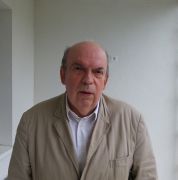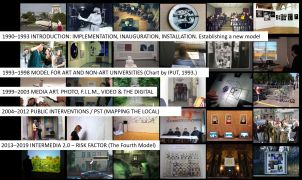As I was not able to attend this year's Ars Electronica, so I do not know "who owns the truth," as that was a topic there. The secret was probably revealed there, but I have learned to care more about what the truth is than who owns it. People of my age, who were active even in the late 1970s, as well as during the last decade of the socialist regimes in central Europe, may remember that it was wishful thinking to hope that the system will collapse during their lifetime. Around 1989/1990 as a sudden event, it happened with a promise that normality had finally arrived.
Two decades later it became clear that it was wishful thinking, better to say, an illusion. However, this is not “die Moral”: it would be not easy to deny that the 1990s was a unique period which, to consider human timeline historically, was exceptionally rare. What was before: normality, what exists now--normality. During the ten years from 1989 to 1999/2000 many special and unique initiatives, interconnected monads, inspiring circles and communities were born and active, producing enough material for several generations of Ph.D., students (will there still be some universities?) of the future. Anyway, I am glad to have been a part of this exceptional period. Nowadays we all experience a specific eclectic combination of past and almost forgotten ideas, including the worst part of the19th century, Nationalism; and the worst of the 20th century, --Fascism and the amorphous, but effective, fatuous & inept casualty, ordinariness of Central European bureaucratic socialisms. This syncretism is the new contemporary, or "the style," the pragmatic arrogance.
Once even the officials of the European Union collected and listed some of these institutions of the 1990s in a small booklet (Digital culture in Europe, Mediacult, 1999). But this was almost forgotten, like the initiatives themselves. It is time to reveal the stories and facts, happenings and results, productions and un-realized projects (the “chicks not even hatched”) and to collect them into some database--or simply dedicate this work as an offering to the Mnemosyne, the Goddess of memory.
The Center for Metamedia Plasy was one of these conceptual or cognitive huts (or barrack-monastery) and Olomouc Museum is now the citadel, which considers this virtual hermitage as belonging to its territory. (Olomouc is even significantly mentioned in Lev Tolstoy’s War and Peace, which became a very relevant source today again).
What should we hope for beyond art? I mean, quite a nice bouquet of known and unknown qualities exists to postpone the digging of the grave of the enthusiastic give-up. There is still the curious specialty of human history that people not only die, but are also born with brains and cognitive interests; at least I have this experience.
Finally, to go back to Ars Electronica again: I once had the lucky chance to hear Anton Zeilinger's lecture there, and it occurred to me now that the unknown network we call “the world” is possibly not hopeless from another perspective either. I mean, a kind of entanglement of (old & new) people and (new & old) initiatives should exist, as in the laws of physics, even without an explicit knowledge or description of its form or activity. Like a potential, or imaginary thermodynamic machine, producing valuable information against entropy.
Budapest, September, 2023
1. The topic of the Europe’s largest festival for art, technology and society Ars Electronica in 2023 was: “Who Owns the Truth?”
see further: ars.electronica.art/who-owns-the-truth/en/
2.Digital culture in Europe, Mediacult, 1999 (https://www.waterstones.com/book/digital-culture-in-europe/council-of-eu...)
3.Anton Zeilinger is an Austrian quantum physicist and Nobel laureate in physics. He is professor of physics emeritus at the University of Vienna and senior scientist at the Institute for Quantum Optics and Quantum Information of the Austrian Academy of Sciences. Most of his research concerns the fundamental aspects and applications of quantum entanglement.
https://www.nobelprize.org/prizes/physics/2022/zeilinger/facts/

